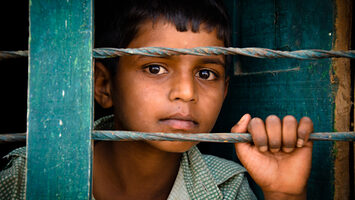Internet Access is the Best Refugee Lifeline
The internet is the world of opportunity for refugees.

A person may become a refugee as a consequence of war, famine, or persecution based on political, personal, or religious identities. Today, 65 million refugees worldwide face some of the most dire circumstances imaginable.
Cellular and internet capabilities would give refugees access to a greater degree of freedom in their personal monetary decisions, which immensely improves their standard of living. This is to be expected, given the libertarian insight that choice is essential for progress and wealth accumulation.
An example of cellphones contributing to the improvement of refugees’ lives can be seen in the Nyarugusu refugee camp in Tanzania.
In the Nyarugusu camp, demand for phones, especially devices with internet access, is incredibly high. Social and emotional wellbeing is drastically improved with just basic phone services. Individuals with access to the internet through their phones show even greater improvements. Internet access facilitates educational and monetary opportunities. In camps like Nyarugus, electricity is hard to come by so the finding charging stations for these critical devices is difficult and expensive. Refugees even say they are willing to sacrifice food security and savings to benefit from the opportunities phones provide.
Previously, where refugees would have had to wait for hours in long lines to use the single camp phone to place a call, social media provides a world of connection in seconds. It acts as a safety net when families are scattered across the world: Far-flung brothers and sisters see each other in seconds through FaceTime, and parents can see children separated abroad grow up. Refugees also report entertainment and information as significant psychological benefits of phone access. Music and movies can liven a gloomy day and allow for minor indulgences in often dreary camps. Online news provides updates from homes they may never see again. Refugees, like everyone else, are willing to pay for that comfort and closeness.
One of the most noteworthy impacts of refugee internet usage is online banking and money-lending. Sometimes the aid distributed at these camps is insufficient or does not match the refugees’ needs. In Tanzania, refugees use cell phones to ask relatives for money when necessary. Mobile payments through wireless capabilities such as Near Field Communication, popular in Africa, allow small and medium-sized businesses to flourish where they previously would not have existed. Refugees in other camps use applications to search the weather and market prices of their crops to ensure a profit.
The free movement of money, enhanced through informal enterprise, has become a mainstay of life in Nyarugusu. Internet and cellular access provide the framework which makes this possible. Phones allow for cash assistance to be directly deposited to those in need, instead of shuffled around through food vouchers and material goods. Organizations like the International Rescue Committee are switching to cash payments given the increasing demand for mobile deposit capability. By giving refugees cash instead of goods, we empower them to find the best way to invest their resources without paternalistic interference.
There are definitely inefficiencies in the current system of aid, which relies heavily on donations of items like bricks and blankets. These types of donations do little to alleviate the underlying problems facing refugees. Refugees do need material aid, but organizational inefficiencies cause them to be sent too much of one item and not enough of another. This can lead to frustrating impasses; for example, refugees might be sent the materials to build, but not be given the necessary tools. Humanitarian aid in the form of mobile network expansion avoids the pitfalls of a top-down approach by giving refugees the power of spontaneous order, business building, and freedom of choice in their own lives.
Mobile deposits are also quicker and less prone to manipulation than cash. Assistance can come in a matter of seconds with a money transfer, and refugees can keep track of those payments by staying in contact with their caseworkers. As well as being more convenient, they are also more secure—mobile deposits are harder to steal than cash. If we genuinely want to improve conditions for struggling refugees, we ought to extend network coverage to them. Rural refugees naturally face a larger barrier to accessing the internet than urban refugees, but that does not mean they should be left in the desert dust.
For mobile network operators, this a largely untapped market. Refugees want access to opportunity and will gladly pay for any services necessary. Expanded coverage would earn the operators more users, and improve the wellbeing of refugees. As refugees gain internet access, mobile network operators would be pressed to offer more choices. The variety of services provided to refugees would expand to meet the wants of this market, and increased competition from various operators would also drive the cost of access down--which currently stands as the most substantial barrier for many refugees.
Considering that billions of dollars in aid are given each year by the UNHCR --over $1 billion of which is from the United States this past year, it is essential to know where that money is going. Instead of sending materials, we should be expanding network capabilities. The internet has given us an incredible boost of information and opportunity. Refugees should have this same chance.
Very few of us can imagine our lives without the ease and enjoyment that comes from internet access. Why deny the poorest among us the same benefits? Not only does internet access provide opportunities for employment and prosperity, it also allows for people scattered across the world to communicate with their families.